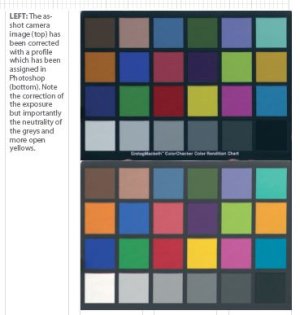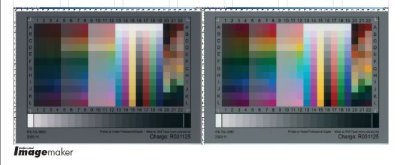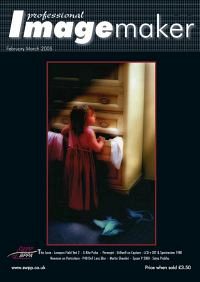articles/Digital/takingpulse-page3
Taking the pulse of your colours - part 3 of 1 2 3
by Mike McNamee Published 01/02/2005

The composite image shown illustrates the improvement obtained by making a profile specifically for a camera set up (and remember the lighting and camera setting have to stay constant!). The adjustment of the whole gamut produces greater overall accuracy. The monochrome tone scale was 7 Lab points too blue-cyan before application of the profile and within 1 point of neutral afterwards.The tone level was 14% too dark before profiling exactly correct afterwards. The speed at which you can profile a camera makes it feasible to profile studio product shots every time. For wedding work our preference would remain with using RAW files and correcting a Macbeth shot occasionally.
For the scanner profiling we used the Nova Darkroom IT8 target. With a scanner target you are either supplied a data file on disc or you can visit (for example) the Kodak web site and pull the relevant one down. This is where the Wolf Faust (i.e. Nova) targets have the edge because they are controlled to a closer tolerance than that demanded by the ISO standard. The process is simple to use. You scan the target with all colour adjustments turned off and then save a TIFF file with no profile tagged. When prompted by the Pulse wizard, you navigate to this TIFF file and also to the data file, which you have precopied into the Preferences folder of Pulse. Assuming your target is the right way up Pulse finds the marker points and positions itself automatically to take the measurements. You then build the profile and assign it in Photoshop to correct all future scans. Both transparency and reflective targets may be scanned although only a reflective target is provided in the kit. If you are new to colour management you need to know that it is not possible to calibrate for negatives, so don't even think about it!

Conclusion Part 1
We like Pulse a lot! It is well thought out, easy to use and accurate. If you are at Focus make sure you go and see it at either the Colour Confidence stand or the Bodoni Systems stand. We will report on the monitor calibrator next issue.
Key Points · Patch sizes are small, giving less wastage and faster profiling · Intelligent strip identification and speed adjustment · High repeatability · High accuracy · Remote, un-tethered use · Comprehensive camera, scanner, monitor, printer and RIP abilities · Good Profile Adjustment tools · Good gamut display · Absolute simplicity of use In Part 2 we look at the monitor calibration device and software.
Please Note:
There is more than one page for this Article.
You are currently on page 3
- Taking the pulse of your colours page 1
- Taking the pulse of your colours page 2
- Taking the pulse of your colours page 3
1st Published 01/02/2005
last update 09/12/2022 14:59:32
More Digital Articles
There are 0 days to get ready for The Society of Photographers Convention and Trade Show at The Novotel London West, Hammersmith ...
which starts on Wednesday 14th January 2026





